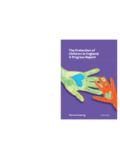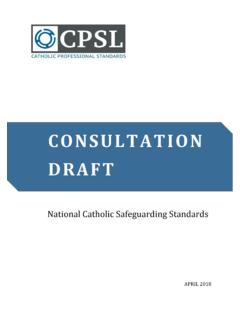Transcription of A All--FFaallaahh TThhee SSuunnfflloowweerr NNuurrsseerryy ...
1 Al-Falah The Sunflower Nursery policies & procedures Introduction policies and procedures help you to provide good quality provision. They do this by making clear to staff and parents what sort of setting you want to be and what has to be done to make this happen. Section in the Statutory Framework of the Early Years Foundation Stage requires providers to have written policies and procedures and to ensure all staff are given copies at their induction and that they are provided and explained to parents. The Welfare Requirements within the Statutory Framework of the Early Years Foundation Stage replace the National Standards for Under 8s Daycare & Child minding. There are five overarching general requirements, as follows. Safeguarding and promoting children 's welfare The provider must take necessary steps to safeguard and promote the welfare of children . The provider must promote the good health of the children , take necessary steps to prevent the spread of infection and take appropriate action when they are ill.
2 children 's behavior must be managed effectively and in a manner appropriate for their stage of development and particular individual needs. Suitable people Providers must ensure that adults looking after children , or having unsupervised access to them, are suitable to do so. Adults looking after children must have appropriate qualifications, training, skills and knowledge. Staffing arrangements must be organised to ensure safety and to meet the needs of the children . Suitable premises, environment and equipment Outdoor and indoor spaces, furniture, equipment and toys must be safe and suitable for their purpose. Organisation Providers must plan and organize their systems to ensure that every child receives an enjoyable and challenging learning and development experience that is tailored to meet their individual needs. Documentation Providers must maintain records, policies and procedures required for the safe and efficient management of the setting and to meet the needs of children . Each general requirement is set out in three sections: The overarching general requirements.
3 The specific requirements. Statutory guidance. Providers must meet all the statutory requirements and have regard to statutory guidance. The required policies and procedures within this document have been organized under each of the five general requirements as they appear in the statutory guidance document. Also included are policies or procedures that we recommend as good practice. Where appropriate, links to the corresponding EYFS Key Themes and Commitments are made. Section in the Statutory Framework of the Early Years Foundation Stage requires providers to carry out formal risk assessments and constantly re-appraise the environment and activities to ensure safety is maintained. Therefore risk assessments have also been included, as in some cases these stand alongside procedures , especially, for example, for health and safety. Templates for, and a brief guide to, risk assessment have been included as well as links to relevant legislation or guidance. 3. In this book, the overarching policy statement is set out at the start of each section followed by the relevant procedure describing how the policy will be fulfilled in a consistent and standardized way.
4 Overview of the Aims & Objectives To work within the framework of The Early Years Foundation Stage and other guidance that Ofsted/Redbridge Early Years might give. To provide a safe and healthy environment for children and adults. To progressively develop the full potential of each child as an individual and to carefully monitor their development. To take a positive interest in children 's cultural background and to recognise and respect the aims and values of parents. To provide a calm, relaxed and stable atmosphere where the children feel secure. To respect each child as an individual and help to promote a positive self image. To support parents in child rearing, gather and exchange relevant information and complement changing patterns of family life. To make time to meet together to discuss; - o 1) Ways of providing an appropriate curriculum that will enable the children learn and develop new skills. o 2) Ways of working together to develop a consistent approach to varying patterns of behaviour.
5 O 3) Review policies , practices and procedures on a regular basis and revise and adapt, as and when necessary. To keep up to date with current codes of practice and further our professional and personal development by seeking ongoing training opportunities. To communicate effectively with parents/carers and team members. To demonstrate and promote an awareness of equal opportunity. To have up to date understanding and knowledge regarding issues of safeguarding children . To promote and develop links with local schools and other support agencies. To work professionally at all times and provides good role model 4. Section Safeguarding children Safeguarding and promoting children 's welfare 5. Safeguarding children children 's rights and entitlements Policy statement We promote children 's right to be strong, resilient and listened to by creating an environment in our setting that encourages children to develop a positive self image, which includes their heritage arising from their colour and ethnicity, their languages spoken at home, their religious beliefs, cultural traditions and home background.
6 We promote children 's right to be strong, resilient and listened to by encouraging children to develop a sense of autonomy and independence. We promote children 's right to be strong, resilient and listened to by enabling children to have the self-confidence and the vocabulary to resist inappropriate approaches. We help children to establish and sustain satisfying relationships within their families, with peers, and with other adults. We work with parents to build their understanding of, and commitment to, the principles of safeguarding all our children . What it means to promote children 's rights and entitlements to be strong, resilient and listened to'. To be strong means to be: secure in their foremost attachment relationships where they are loved and cared for, by at least one person who is able to offer consistent, positive and unconditional regard and who can be relied on;. safe and valued as individuals in their families and in relationships beyond the family, such as day care or school.
7 6. self assured and form a positive sense of themselves including all aspects of their identity and heritage;. included equally and belong in early years settings and in community life;. confident in abilities and proud of their achievements;. progressing optimally in all aspects of their development and learning;. To be part of a peer group in which to learn to negotiate, develop social skills and identity as global citizens, respecting the rights of others in a diverse world;. and To participate and be able to represent themselves in aspects of service delivery that affects them as well as aspects of key decisions that affect their lives. To be resilient means to: be sure of their self worth and dignity;. be able to be assertive and state their needs effectively;. be able to overcome difficulties and problems;. be positive in their outlook on life;. be able to cope with challenge and change;. have a sense of justice towards self and others;. to develop a sense of responsibility towards self and others; and to be able to represent themselves and others in key decision making processes.
8 To be listened to means: adults who are close to children recognize their need and right to express and communicate their thoughts, feelings and ideas;. adults who are close to children are able to tune in to their verbal, sign and body language in order to understand and interpret what is being expressed and communicated;. adults who are close to children are able to respond appropriately and, when required, act upon their understanding of what children express and communicate ; and 7. Adults respect children 's rights and facilitate children 's participation and representation in imaginative and child centered ways in all aspects of core services. 8. Safeguarding children Safeguarding children and child protection (Including managing allegations of abuse against a member of staff). Policy statement Our setting will work with children , parents and the community to ensure the rights and safety of children and to give them the very best start in life. Our safeguarding policy is based on the three key commitments of the Pre-school Learning Alliance Safeguarding children Policy.
9 procedures We carry out the following procedures to ensure we meet the three key commitments of the Alliance Safeguarding children Policy. Key commitment 1. Al-Falah The Sunflower Nursery is committed to building a 'culture of safety' in which children are protected from abuse and harm in all areas of its service delivery. Staff and volunteers Our designated person (a member of staff) who co-ordinates child protection issues is: Louiza Meksem (Nursery Manager). We ensure all staff and parents are made aware of our safeguarding policies and procedures . We provide adequate and appropriate staffing resources to meet the needs of children . 9. Applicants for posts within the setting are clearly informed that the positions are exempt from the Rehabilitation of Offenders Act 1974. Candidates are informed of the need to carry out 'enhanced disclosure' checks with the Criminal Records Bureau before posts can be confirmed. Where applications are rejected because of information that has been disclosed, applicants have the right to know and to challenge incorrect information.
10 We abide by Ofsted requirements in respect of references and Criminal Record Bureau checks for staff and volunteers, to ensure that no disqualified person or unsuitable person works at the setting or has access to the children . Volunteers do not work unsupervised. We abide by the Protection of Vulnerable Groups Act requirements in respect of any person who is dismissed from our employment, or resigns in circumstances that would otherwise have lead to dismissal for reasons of child protection concern. We have procedures for recording the details of visitors to the setting. We take security steps to ensure that we have control over who comes into the setting so that no unauthorised person has unsupervised access to the children . Key commitment 2. Al-Falah The Sunflower Nursery is committed to responding promptly and appropriately to all incidents or concerns of abuse that may occur and to work with statutory agencies in accordance with the procedures that are set EYFS framework Responding to suspicions of abuse We acknowledge that abuse of children can take different forms - physical, emotional, and sexual, as well as neglect.






